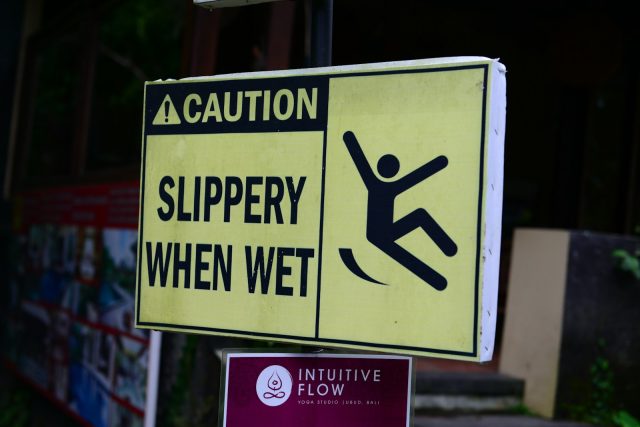A quick trip to the grocery store or a stroll through the mall shouldn’t end in a visit to the ER. But for thousands of people every year, that’s exactly what happens.
Wet floors, uneven tiles, poor lighting, and cluttered aisles all present dangerous hazards to patrons. If you’ve been injured by a business’ negligence, it’s important to pursue a claim so you’re not left paying for their mistakes.
Why you need to file a claim
If you slipped or tripped and fell in a store, it might feel like “just an accident,” but legally, businesses have a duty to keep their premises safe. Sure, sometimes genuine accidents happen, but most of the time these accidents are preventable. Filing a claim for your injuries will hold them accountable and protect your finances.
Even minor injuries can result in costly medical bills, like X-rays, ultrasounds, CT scans, MRIs, and physical therapy. When you file a claim, you’ll be reimbursed for these expenses. You’ll also get compensated for lost wages if you’re unable to work. That will make it easier to pay your household bills without dipping into savings.
Filing a claim also protects lost future wages if your injuries will keep you from working for any length of time. And if your injuries are permanent and you can’t return to work, a claim can compensate you for lost earning potential.
You shouldn’t have to be financially responsible for someone else’s negligence. So don’t hesitate to pursue compensation to hold the responsible party accountable legally and financially.
Report the incident to store management immediately
It’s important to report your accident to the store’s management right away to establish a record that it took place. Without documentation, it will be your word against theirs. Report your fall as soon as it happens. Request a copy of the incident report. They may not be legally required to give you a copy so talk to your lawyer to get it.
Try your best to take photos before anyone cleans up the hazard, whether it’s a chemical spill, liquid, clutter, or a structural problem. Gather contact information from witnesses as soon as possible and you may even want to record them explaining what they saw happen. You’ll need witness statements to strengthen your claim and reduce the impact if the store disputes your injuries.
Seek medical attention right away
Although it may not seem connected to filing a claim, getting medical help immediately is critical. Of course, you want to get necessary treatment, but don’t delay a visit to the ER or your doctor, even if you feel like you can wait. Waiting will only give the negligent party a reason to doubt the severity of your injuries, and it will give them reason to diminish or deny your claim.
Understand business liability
Not every fall constitutes a valid claim. To get compensated, you’ll need to prove the business was negligent. That requires establishing several things:
- Duty of care. Businesses have a legal duty to maintain safe premises for customers. In most cases, duty of care is a given.
- Breach of duty. You’ll need to prove that a business was negligent in breaching its duty of care.
- Knowledge of the hazard and failure to act. Liability often depends on whether staff knew (or should have known) about the hazard. For example, if staff knew about spilled liquid and walked away leaving it unattended to get the clean-up powder, that can make the store liable. On the other hand, if the spill just happened and nobody knew about it, that may not create liability. However, when stores are sued for injuries, they often settle, even when they aren’t legally at fault.
Be cautious of insurance adjusters
After being injured in a slip-and-fall accident, you’ll probably get a call from the business’ insurance company. Proceed with caution. Don’t say things like, “I wasn’t watching where I was going” or “I didn’t see the hazard.” These statements can be used against you as an admission of fault.
They’ll likely ask you to give a recorded statement. Don’t do it. You’re not legally obligated to provide a recorded statement so don’t risk it. It won’t serve you. The insurance adjuster will only be looking for reasons to deny or devalue your claim.
It’s best to let your lawyer talk to the insurance company so you don’t accidentally hurt your ability to get compensated fairly.
Don’t handle the burden alone
Experiencing an injury in a public place can be physically and financially devastating. But filing a claim can make sure you don’t pay for someone else’s negligence. With good documentation, a record of medical care, witness statements, and a good lawyer, you’ll have the best chance at recovering the compensation you deserve.








